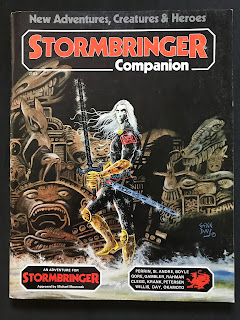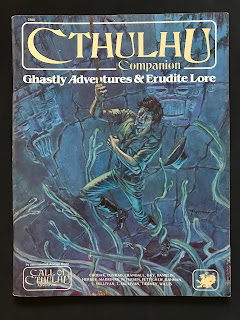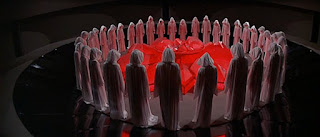The year: 2021. The event: #RPGaDay. Here is the culmination of a month of tweets wrestling with daily prompts on the subject of... RPGs.
#RPGaDay2021 1. "Scenario": I think the best scenarios I have run are those that are half-written, half-improvised, whether I've written it myself (sometimes in the form of mere notes and drawings) or I've taken liberties with a published adventure.
First, make the scenario your own; then, make it your players'. It isn't an instruction manual. It's a guide to what might be out there and what might happen. The scenario is the starting point, not the finishing line.
When you don't have a scenario handy, let the PCs decide what to do. Let them engage in training, research, carousing, shopping, etc. Have a few NPCs on file just in case. Let the PCs get themselves in trouble. The scenario writes itself.
Players are often a reliable source of side quests, too. These can be brief interludes, or they can be woven into the tapestry of a greater adventure or even a campaign.
Unmodules, by the way, harken to the days when adventures were known as "modules." Modules are created for player characters to interact with. Unmodules are created by the player characters' interactions.
I explain the unmodule in greater detail here: A Very Happy Unmodule to You!.
#RPGaDay2021 2. "Map": Mapping per the old D&D standard, whereby one player is designated the mapper and tries to faithfully replicate on paper the DM's description of the player characters' surroundings, is a laborious process.
I recall one time in 1980-something being so frustrated with a mapper's inability to draw what I described that I took the map and drew it myself, not aware that the beauty of the process was its imperfection. Every inaccuracy has the potential for misadventure.
Instead of letting the players pay for their inaccuracy, I did the work for them. Soon, I was drawing the maps in front of them on Battlemats with wet-erase pens, and then on chalkboards.
I still resort to this method now and then, sometimes with a Noteboard (a portable dry-erase board), but often I just use verbal description and allow players to map if they wish by whatever means they find expedient.
What I really like to do (and don't do often enough) is give the players a hand-drawn map as a prop they can use. A good map can convey far more than the obvious for those who are clever.
#RPGaDay2021 3. "Tactic": If your go-to "tactic" is to send your henchmen into peril ahead of you to spring traps or act as decoys, find a different tactic. You can do better. Unless you are playing a comic book villain, in which case, treat those lackeys like cannon fodder.
#RPGaDay2021 4. "Weapon": Every magic weapon ought to be unique. Every magic weapon ought to have its own name, even if no one knows it (yet). Every magic weapon ought to have its own history, which could potentially be discovered. Some magic weapons might have a destiny.
#RPGaDay2021 5. "Gamble": I do not enjoy gambling as a recreation in real life, but I will gladly gamble as a character in a role-playing game. I played a gunslinging gambler in a game of Boot Hill back in 1980-something, and it was very enjoyable... even when I lost!
And if anyone accused my character of cheating (which he often did), there was always a nice gunfight to look forward to.
#RPGaDay2021 6. "Chase": How can I have role-played this long without experiencing a car chase? I think I was involved in a chariot chase once, but never a car chase.
#RPGaDay2021 7. "Small": Dear game publishers, please avoid using small fonts, overly ornate typefaces, and background images in the pages of your rule books and other publications. Never underestimate the importance of reading comfort. #RPG #TRPG #TTRPG #TTTRPG
#RPGaDay2021 8. "Stream": Timestream. Time Stream. In the 1980s, a system-neutral article about time travel appeared in a gaming magazine, and it inspired me to run an adventure based on the premise it presented. I used Chaosium's Basic Role-Playing as its base.
I can recall neither the author nor the title of the article, but I think the term "timestream" was prominent. I keep thinking the magazine might have been Sorcerer's Apprentice or Different Worlds, but a review of my copies has been inconclusive.
Issue 29 of Different Worlds has an article that seems similar to my memory of the Timestream article: "Godwar: How to Run a Multiverse Campaign" by Mike Sweeney. I even bookmarked it with a sheet containing the names of the players in my Timestream game and their characters.
Maybe "Godwar" was the article and "Timestream" was what I named the game. Maybe. 1983 was a long time ago. If anyone knows of another "Timestream" article from that era, please let me know.
Meanwhile, this is what was written on that sheet I had used as a bookmark (real names redacted):
- Martika the Councillor
- Lord Rodgers
- D___: Magus Claudius
- A_____: Dod Bodgers
- M_____: Sir Thorremme
11 3
Mysterious, eh?
The "Godwar" article is useful and interesting even if it isn't the article I was looking for (and it might be). It's short, but it's worth reading if you can find it. #Timestream
#RPGaDay2021 9. "Role": I think everyone ought to spell it "rôle."
"Oh, don't mind me! I'm off to play a rôle-playing game!"
(Apologies to the late Graham Chapman.)
#GrandPiano #MontyPythonsFlyingCircus
#RPGaDay2021 10. "Advantage": Please note well, it is to everyone's advantage to take notes during a game.
#NotaBene
#RPGaDay2021 11. "Listen": I don't require players to roll to listen or see or use any of their senses. I want to describe their surroundings as vividly as I can, so why would I sabotage that with a stupid roll?
And if players are engaged enough in the game that they are actively using their senses in specific ways to try to learn more, what purpose does it serve to leave it to chance? Reward them with more information!
#RPGaDay2021 12. "Think": Non-player characters ought to think and not just react. They have their own motivations and ought to act accordingly. And since they think, they can also have a change of heart. At least, it's possible.
#RPGaDay2021 13. "Pool": In January 2013, I posted an article in Applied Phantasticality about mystical pools, which featured a table enabling one to generate a magical effect for these enigmas. Here is the link: Table: Mystical Pools.
The table is designed for use with D&D and early D&D-compatible retro-clones, but I think it might be useful to post alternate versions of tables like this for DCC RPG, Savage Worlds, and other systems. And/or I could just make system neutral versions.
This could be a good source of fodder for some of my other gaming blogs when I need a topic and my monthly deadline is drawing near. A reservoir—nay, a pool, if you will—of potential blogging material. Any reworked articles will, of course, include links to the source.
#RPGaDay2021 14. "Limits": I do not support level limits in RPGs that have character levels.
EXCEPT when there is a logical and consistent reason for them, e.g. Law and Chaos and Level Limits.
BUT I still prefer the absence of level limits.
AND, to be honest, I prefer it when role-playing games do not use character levels. They don't provide anything I need in a game.
#RPGaDay2021 15. "Supplement": My favorite RPG supplements (and I'm not including system neutral books here) are the Stormbringer Companion, the Ringworld Companion, the Cthulhu Companion, and the Judge Dredd Companion.
I'm not including any D&D books here, because who is to say what's a core book and what's a supplement in that game? Besides, D&D gets more than enough attention. I'm far more interested in the great role-playing games that get overlooked.
Honorable Mention goes to Demon Magic: The Second Stormbringer Companion. Just look at that cover art.
#RPGaDay2021 16. "Move": I'm not interested in any RPG combat system that reduces a fight to standing still and exchanging blows. I want to see combatants move: dodging, blocking, parrying, feinting, tumbling, rolling, leaping, swinging, running, crawling, tripping, grappling.
In other words, I have a preference for swashbuckling. I even have a blog on the subject: Theoretical Swashbuckling.
#RPGaDay2021 17. "Trap": A good trap has someone with a motive behind it, the potential to be detected before triggering it, and a consistent mechanical or magical logic. You can interact with it. You can learn from it.
A bad trap is the sort common to solitaire adventures and certain "killer dungeons." You have a choice: Open the door or move on. If you open it, you die. No chance to detect it, deactivate it, or dodge it. You picked Door Number One, and your reward is insta-death.
The method of insta-death may vary—it could be an arrow, a spear, a spiked pit, a death ray, a 16-ton weight, etc.—but the result is the same and cannot be appealed.
Only two kinds of adventurers survive the bad trap: the kind who force henchmen to take all the risks (highly implausible), and the kind who refuse to adventure. Don't include bad traps in your adventure. Be better than that. I know you can.
#RPGaDay2021 18. "Write": Back in 1980-something, I wrote to an RPG publisher to ask for their submission guidelines. Sometime later, I received the guidelines, but there was a note attached.
In this note, I was thanked for writing to them, I was told how much they enjoyed our conversation at Gen Con, and I was asked if I would be interested in writing a Narnia RPG for them.
This sounded like a wonderful opportunity, but I had no recollection of the conversation, and I was convinced the publisher had me confused with someone else. I had many conversations with publishers at the previous Gen Con, but surely none remembered me.
Furthermore, I had not at that time read any of the Narnia novels. I think at most I had seen the animated version of The Lion, the Witch, and the Wardrobe. It certainly didn't qualify me to write an RPG based on it.
Nonplussed, I never replied and gave up the idea of writing for that company.
The thought of having to write a cover letter explaining that I was not who they thought I was, but here's a submission anyway killed my motivation.
So be it. I was disappointed with the Chronicles of Narnia once I finished reading them and would not have enjoyed adapting it. Nor can I imagine deriving much joy role-playing in such a setting.
Sometimes I wonder, though, what would have happened if I had played along and said, "Why yes, I am interested in designing your Narnia role-playing game for you!"
I also wonder who they thought I was...
#RPGaDay2021 19. "Style": I admit I usually prefer minimalism in my rule books. I want clarity and simplicity in both the rules themselves and their visual presentation.
If a rule book looks cluttered and disorganized or even hyper-organized, I begin to wonder whether it's worth the trouble to read. Usually it isn't. Sometimes it is, but I'll complain about it and harbor a certain amount of resentment.
#RPGaDay2021 20. "Foundation": The foundation of a good role-playing experience is mutual respect and trust between participants. Nothing in the game is as important as this.
#RPGaDay2021 21. "Simplicity": Simplicity of game design enables ease of use by every criterion. Ease of: learning, teaching, playing, GMing, adventure-writing, house-ruling, improvising. It saves time and allows one to concentrate on what makes role-playing fun.
I know there are those who prize complexity for whatever reasons. I prefer to save the complexity for the role-playing rather than the rules. I'd rather actively play the game than waste my precious gaming time consulting rule books at the table.
Simplicity enables one to internalize the rules more quickly, and that is a hallmark of superior game design.
#RPGaDay2021 22. "Substitute": A game of Teenagers from Outer Space in which the players play substitute teachers instead of students would take it to another level of challenge and comedy. "Substitutes from Outer Space" for the win!
Naturally, the substitutes needn't all be from outer space. Faculty as well as students can be a mix of Earthlings and extra-terrestrials.
#RPGaDay2021 23. "Innovation": There is constant innovation in RPG design. The role-playing game itself is an example of astounding innovation.
Sometimes, though, RPG enthusiasts are unaware that a thing they think is a new innovation is really a rediscovery of something introduced decades ago.
Many were introduced in such games as Tunnels & Trolls, Bunnies & Burrows, Ghostbusters, Call of Cthulhu, James Bond 007, Prince Valiant, and others.
There is value in studying history, even the history of a hobby. A toast: To the innovators, past, present, and future.
#RPGaDay2021 24. "Share": One of my favorite ways that RPG enthusiasts share their love of the hobby is through starting blogs, regularly posting to them, and linking to other blogs they find interesting. So much can be shared with a blog: knowledge, creativity, inspiration, news.
Sometimes it seems as if the art of blogging is waning, but it endures. Blogs and home pages preserved our hobby at a time when it seemed as if it might disappear, and I believe blogs (and zines and podcasts) are the hobby's ultimate lifeline.
Whatever happens to the industry, blogs, zines, and podcasts will keep the hobby alive by keeping us connected. The more we share, the richer we all become.
How can you share? Start a blog, zine, and/or podcast. Share links to the ones you like. And leave comments. Engagement is the easiest way to ensure their continuation. People like to know their work is appreciated. It's a powerful motivator.
#RPGaDay2021 25. "Box": The best example of a box for an RPG boxed set is the bookcase or bookshelf game. Designed to stand vertically, they are easier to store, less prone to damage than the flimsier traditional boxes, and roomier.
#LordsOfCreation #HeroesOfOlympus
#RPGaDay2021 26. "Renew": For years I've been thinking I need to run a Logan's Run RPG based primarily on the 1976 film and, to a lesser extent, some of the elements from the television show.
#LogansRun #Renew
I would probably create my own system for it, or convert one that doesn't use levels such as The D6 System, Fudge, or Basic Role-Playing. I think it has possibilities.
#RPGaDay2021 27. "Practice": Playing or GMing a role-playing game becomes easier and more enjoyable with practice (like most activities). Please don't be discouraged by mistakes, and don't take it too seriously. It's a game to be played, not a bomb to be defused.
#RPGaDay2021 28. "Solo": A solo RPG adventure involves one player and one GM. A solitaire adventure involves one player and no GM. The two are often confused by members of both the hobby and the industry, but the distinction is clear.
I have run solo adventures using Tunnels & Trolls, Marvel Super Heroes (TSR), and Doctor Who (FASA). I've also played solitaire adventures using T&T. I haven't tried Fighting Fantasy yet, but the books are on my wish list.
#RPGaDay2021 29. "System": The best systems are those that can be easily memorized and taught. That's all I have to say about this topic at the moment.
#RPGaDay2021 30. "Mention": This topic is too vague. I refuse to mention it. A better topic would be Baron Munchausen.
#RPGaDay2021 31. “Thank”: Thank Crom I made it to the end of this year’s #RPGaDay.







